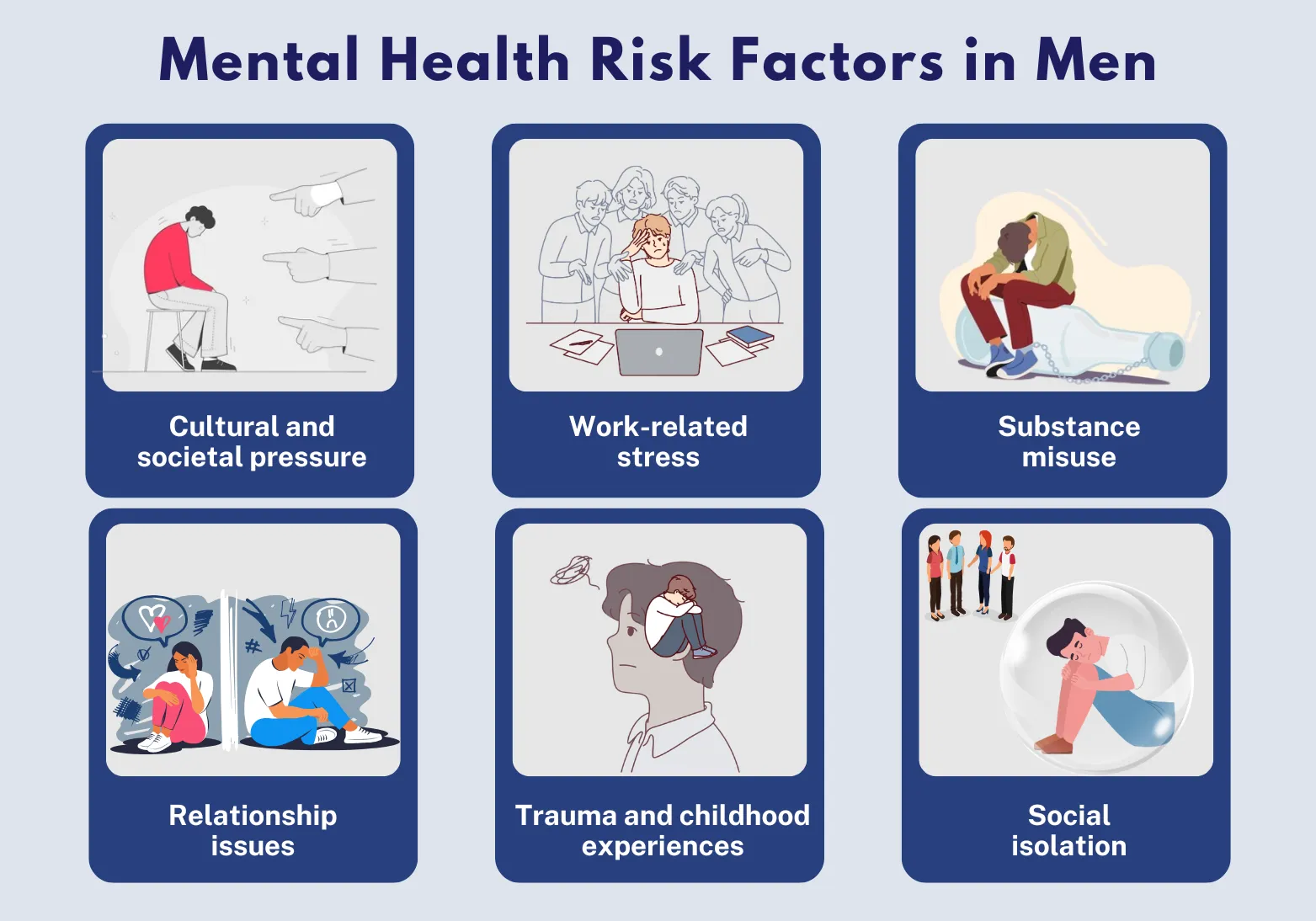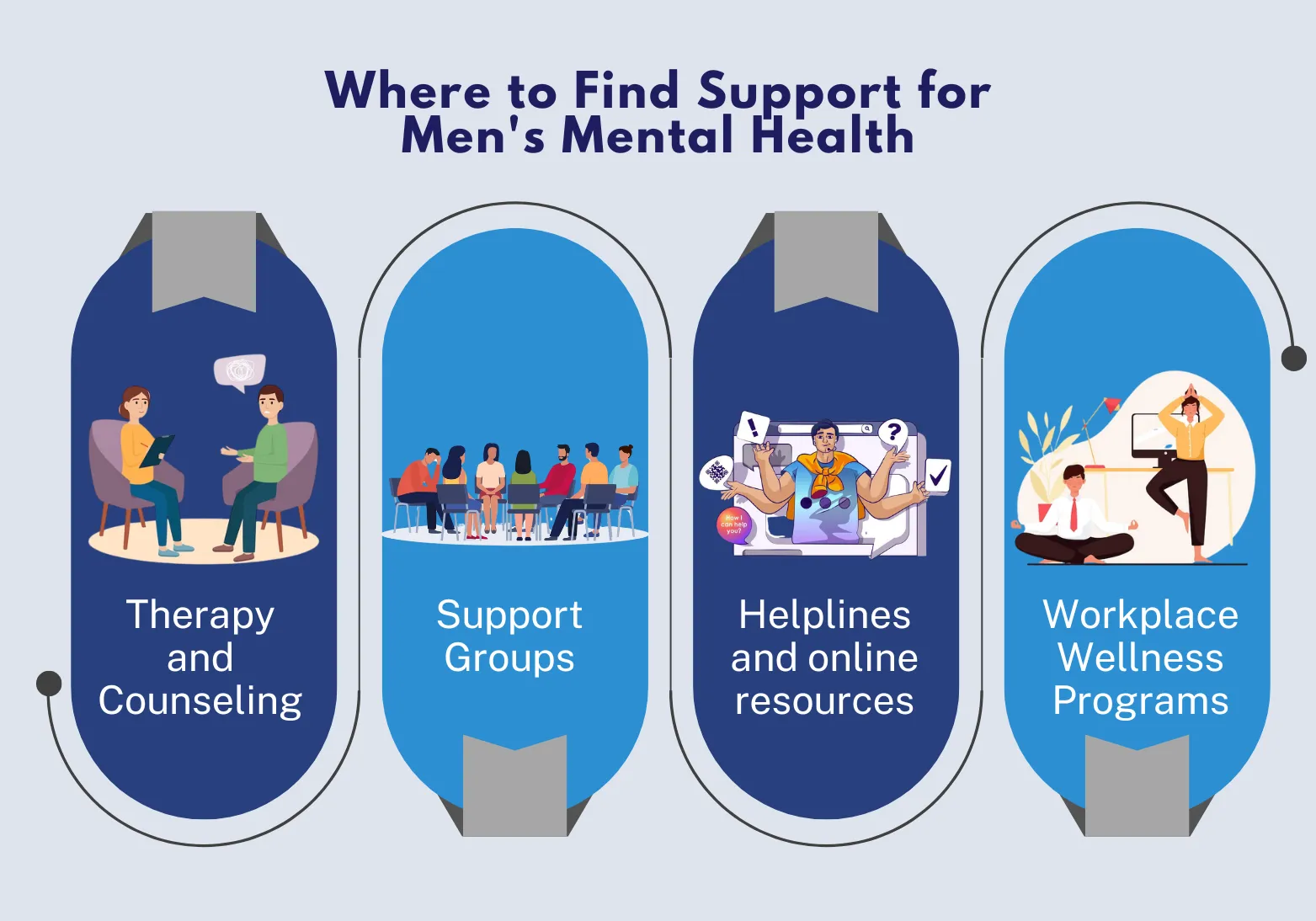TABLE OF CONTENT
- Understanding Men’s Mental Health
- The Silent Crisis: Mental Health Problems in Men
- Why Does Men’s Mental Health Matter?
- Signs of Mental Illness in Men
- Understanding Mental Health Risk Factors in Men
- Steps to Improve Men’s Mental Health
- Overcoming the Stigma: Men and Mental Health
- Where to Find Support for Men’s Mental Health
- Moving Forward: Prioritizing Men’s Mental Health Matters
- Taking the Next Step with Concise Medico
- FAQs
Understanding Men’s Mental Health
Men’s mental health matters since it affects their well-being, bonds, and day-to-day lives. As per findings, men show higher rates of depression and suicidal ideation than women. Mental health in men is regularly ignored, yielding serious effects. Men often avoid discussing their struggles. This silence can cause inner turmoil. It may lead to addiction or even suicide. Unlike females, they generally mask their feelings.
The Silent Crisis: Mental Health Problems in Men
Many men deal with mental health problems. These are depression, anxiety, PTSD, and bipolar disorder. But they often don’t seek help. Evidence states that more men die by suicide than women. In reality, men are three times more likely to take their own lives. The core elements are cultural expectations, an insufficiency of emotional support, and missing mental health signs in men.
Why Does Men’s Mental Health Matter?
Men usually bypass looking for help for mental health issues due to stigma. Many men discover to conceal their feelings. They often avoid showing weakness. This creates a risky pattern where problems worsen over time. Men and mental health issues are not separate. Brushing off symptoms can yield critical results. It can lead to self-harm, substance abuse, and poor health.
UK statistics show that suicide is still the leading factor in mortality rates for men under 50. The ONS states that in 2022, men represented 75% of all suicides in England and Wales. The NIH reports that 36% of NHS talking therapy referrals are for men. This shows a big gap in men seeking expert help. These stats show a pressing need to tackle mental health issues in men. We need to support and urge them to ask for help. It’s not just about seeking help, it’s about being heard. That’s why men’s mental health matters more than ever.
As highlighted by Fiorillo and Sartorius in their 2021 study:
“People living with serious mental illness are, moreover, among the most vulnerable in our society; on average, they experience a reduction in life expectancy of more than ten years”
Fiorillo and Sartorius, 2021
Signs of Mental Illness in Men
Identifying the signals of mental illness in men is essential for prompt treatment because men’s mental health matters. Common symptoms include:
Depression
Steady despair, lack of interest, and loss of drive
Anxiety
Overthinking, intense worry, and freak-outs
Substance abuse
Addiction to alcohol or drugs for emotional relief
Aggression and irritability
Sudden mood swings, frustration, and anger
Social withdrawal
Avoiding friends, family, or work responsibilities
Physical symptoms
Chronic pain, fatigue, and sleep disturbances
If these symptoms are ignored, they can cause major mental breakdowns and hurt well-being.
Know more about the importance of mental health assessments.

Understanding Mental Health Risk Factors in Men
Several factors increase mental health problems in men:
Cultural and societal pressure
Men are often expected to be strong and not to express emotions.
Work-related stress
Stress and anxiety mostly derive from tiring jobs and financial fears.
Common Triggers
- Long hours and job pressure
- Fear of losing job or underperforming
- Work-life balance struggles
- Financial burden causing anxiety
Substance misuse
Many men turn to alcohol or drugs to bottle up their emotions.

Why it Happens
- Using substances to escape pain
- Avoiding emotional conversations
- Peer pressure to drink or use drugs
- Lack of healthy coping tools
Relationship issues
Divorce, breakups, and family fights hurt mental health.
Trauma and childhood experiences
Childhood abuse or unhealed trauma increases sensitivity.
Social isolation
Void of support from friends and family worsens mental conflict.
Steps to Improve Men’s Mental Health
To address men’s mental health matters, everyone must take action.
- Open up in trusted spaces.
- Seek professional help without shame.
- Stay active with a plan. You can try jogging in the mornings, joining a local football group, or doing strength training.
- Prioritise Real Nutrition and Sleep
- Ditch the bottle and other quick fixes
Overcoming the Stigma: Men and Mental Health
A critical limitation to better mental health problems in men is the stigma attached to it. Many men fear judgment or believe seeking help makes them weak. But breaking the silence and speaking up is the first step to healing. Campaigns for mental health, workplace programs, and social support can help men ask for help.
Learn more about mental health stigma.
Where to Find Support for Men’s Mental Health
Many groups provide support for men dealing with mental health issues.
Therapy and Counseling
Expert help can show you how to cope and support your feelings.
Support Groups
Talking with others who have gone through the same things can be helpful.
Helplines and online resources
Many crisis helplines offer 24/7 help.
Workplace Wellness Programs
Employers must back mental health awareness for their staff.

Moving Forward: Prioritizing Men’s Mental Health Matters
Neglecting mental health issues in men can lead to serious problems. Noticing mental illness in men and asking for help on time can save lives. Men’s mental health matters. We must challenge old beliefs by building a supportive environment. Let’s urge men to take care of their well-being. No one should deal with struggles alone—help is out there.
Taking the Next Step with Concise Medico
If you are a man suffering in silence, feeling trapped by the weight of your struggles, know that you are not alone. Concise Medico offers men specific care and expert help to manage their mental health. Seeking help is a sign of strength, not weakness.
Contact Concise Medico now for tailored mental health care. Start your journey to healing and build your resilience.
FAQs
Understanding Men’s Mental Health
Men’s mental health matters since it affects their well-being, bonds, and day-to-day lives. As per findings, men show higher rates of depression and suicidal ideation than women. Mental health in men is regularly ignored, yielding serious effects. Men often avoid discussing their struggles. This silence can cause inner turmoil. It may lead to addiction or even suicide. Unlike females, they generally mask their feelings.
The Silent Crisis: Mental Health Problems in Men
Many men deal with mental health problems. These are depression, anxiety, PTSD, and bipolar disorder. But they often don’t seek help. Evidence states that more men die by suicide than women. In reality, men are three times more likely to take their own lives. The core elements are cultural expectations, an insufficiency of emotional support, and missing mental health signs in men.
Why Does Men’s Mental Health Matter?
Men usually bypass looking for help for mental health issues due to stigma. Many men discover to conceal their feelings. They often avoid showing weakness. This creates a risky pattern where problems worsen over time. Men and mental health issues are not separate. Brushing off symptoms can yield critical results. It can lead to self-harm, substance abuse, and poor health.
UK statistics show that suicide is still the leading factor in mortality rates for men under 50. The ONS states that in 2022, men represented 75% of all suicides in England and Wales. The NIH reports that 36% of NHS talking therapy referrals are for men. This shows a big gap in men seeking expert help. These stats show a pressing need to tackle mental health issues in men. We need to support and urge them to ask for help. It’s not just about seeking help, it’s about being heard. That’s why men’s mental health matters more than ever.
As highlighted by Fiorillo and Sartorius in their 2021 study:
“People living with serious mental illness are, moreover, among the most vulnerable in our society; on average, they experience a reduction in life expectancy of more than ten years”
Fiorillo and Sartorius, 2021
Signs of Mental Illness in Men
Identifying the signals of mental illness in men is essential for prompt treatment because men’s mental health matters. Common symptoms include:
Depression
Steady despair, lack of interest, and loss of drive
Anxiety
Overthinking, intense worry, and freak-outs
Substance abuse
Addiction to alcohol or drugs for emotional relief
Aggression and irritability
Sudden mood swings, frustration, and anger
Social withdrawal
Avoiding friends, family, or work responsibilities
Physical symptoms
Chronic pain, fatigue, and sleep disturbances
If these symptoms are ignored, they can cause major mental breakdowns and hurt well-being.
Know more about the importance of mental health assessments.

Understanding Mental Health Risk Factors in Men
Several factors increase mental health problems in men:
Cultural and societal pressure
Men are often expected to be strong and not to express emotions.
Work-related stress
Stress and anxiety mostly derive from tiring jobs and financial fears.
Common Triggers
- Long hours and job pressure
- Fear of losing job or underperforming
- Work-life balance struggles
- Financial burden causing anxiety
Substance misuse
Many men turn to alcohol or drugs to bottle up their emotions.

Why it Happens
- Using substances to escape pain
- Avoiding emotional conversations
- Peer pressure to drink or use drugs
- Lack of healthy coping tools
Relationship issues
Divorce, breakups, and family fights hurt mental health.
Trauma and childhood experiences
Childhood abuse or unhealed trauma increases sensitivity.
Social isolation
Void of support from friends and family worsens mental conflict.
Steps to Improve Men’s Mental Health
To address men’s mental health matters, everyone must take action.
- Open up in trusted spaces.
- Seek professional help without shame.
- Stay active with a plan. You can try jogging in the mornings, joining a local football group, or doing strength training.
- Prioritise Real Nutrition and Sleep
- Ditch the bottle and other quick fixes
Overcoming the Stigma: Men and Mental Health
A critical limitation to better mental health problems in men is the stigma attached to it. Many men fear judgment or believe seeking help makes them weak. But breaking the silence and speaking up is the first step to healing. Campaigns for mental health, workplace programs, and social support can help men ask for help.
Learn more about mental health stigma.
Where to Find Support for Men’s Mental Health
Many groups provide support for men dealing with mental health issues.
Therapy and Counseling
Expert help can show you how to cope and support your feelings.
Support Groups
Talking with others who have gone through the same things can be helpful.
Helplines and online resources
Many crisis helplines offer 24/7 help.
Workplace Wellness Programs
Employers must back mental health awareness for their staff.

Moving Forward: Prioritizing Men’s Mental Health Matters
Neglecting mental health issues in men can lead to serious problems. Noticing mental illness in men and asking for help on time can save lives. Men’s mental health matters. We must challenge old beliefs by building a supportive environment. Let’s urge men to take care of their well-being. No one should deal with struggles alone—help is out there.
Taking the Next Step with Concise Medico
If you are a man suffering in silence, feeling trapped by the weight of your struggles, know that you are not alone. Concise Medico offers men specific care and expert help to manage their mental health. Seeking help is a sign of strength, not weakness.
Contact Concise Medico now for tailored mental health care. Start your journey to healing and build your resilience.




